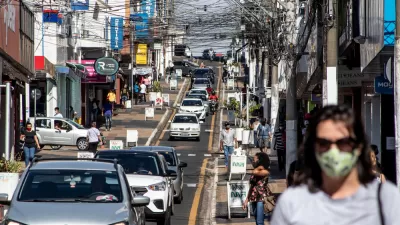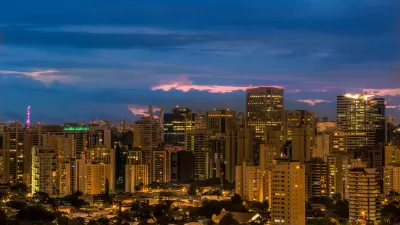Leão Serva reports on the case of São Paulo, where a value capture funding mechanism has raised a huge amount of public revenue to pay for infrastructure projects and public housing.
Here's how the São Paulo value capture program works, according to an article by Leão Serva: "City leaders identify a redevelopment zone, and issue a number of bonds to be sold to developers at auction. The bonds entitle the developers to build bigger buildings than the law would normally allow. Revenue from the bond sales are invested back into housing, roads and other infrastructure in the same redevelopment zone."
Especially in areas with high demand for new construction, developers have not been timid in bidding for these bonds. "And the auctions have yielded the city a massive windfall. In 12 years, São Paulo has raised about R$ 4.5 billion, or close to $2 billion in U.S. dollars, through these sales."
"In São Paulo’s case, the action to unlock land value is 'upzoning' an area for more intense development," but Serva also describes other cities or examples where a value capture program can help close the funding gap for badly needed infrastructure investments.
Serva's coverage is one of the rare examples of clear and accessible writing on what could be wonky subject matter. The article also covers some of the criticisms and recommended reforms for the São Paulo program.
FULL STORY: How São Paulo uses “value capture” to raise billions for infrastructure

Alabama: Trump Terminates Settlements for Black Communities Harmed By Raw Sewage
Trump deemed the landmark civil rights agreement “illegal DEI and environmental justice policy.”

Study: Maui’s Plan to Convert Vacation Rentals to Long-Term Housing Could Cause Nearly $1 Billion Economic Loss
The plan would reduce visitor accommodation by 25% resulting in 1,900 jobs lost.

Why Should We Subsidize Public Transportation?
Many public transit agencies face financial stress due to rising costs, declining fare revenue, and declining subsidies. Transit advocates must provide a strong business case for increasing public transit funding.

Paris Bike Boom Leads to Steep Drop in Air Pollution
The French city’s air quality has improved dramatically in the past 20 years, coinciding with a growth in cycling.

Why Housing Costs More to Build in California Than in Texas
Hard costs like labor and materials combined with ‘soft’ costs such as permitting make building in the San Francisco Bay Area almost three times as costly as in Texas cities.

San Diego County Sees a Rise in Urban Coyotes
San Diego County experiences a rise in urban coyotes, as sightings become prevalent throughout its urban neighbourhoods and surrounding areas.
Urban Design for Planners 1: Software Tools
This six-course series explores essential urban design concepts using open source software and equips planners with the tools they need to participate fully in the urban design process.
Planning for Universal Design
Learn the tools for implementing Universal Design in planning regulations.
Smith Gee Studio
Alamo Area Metropolitan Planning Organization
City of Santa Clarita
Institute for Housing and Urban Development Studies (IHS)
City of Grandview
Harvard GSD Executive Education
Toledo-Lucas County Plan Commissions
Salt Lake City
NYU Wagner Graduate School of Public Service




























